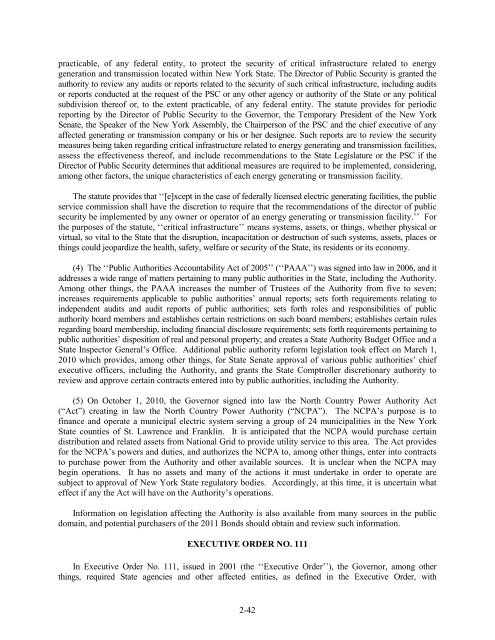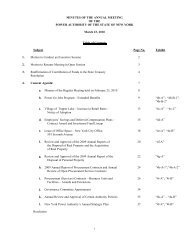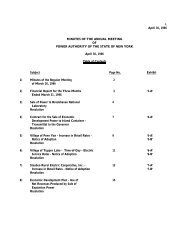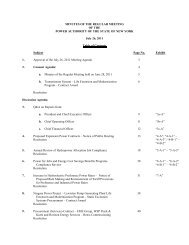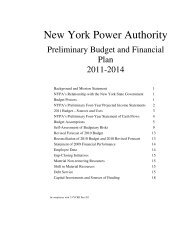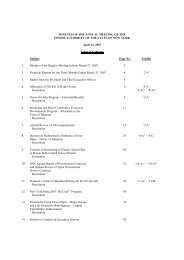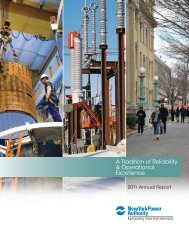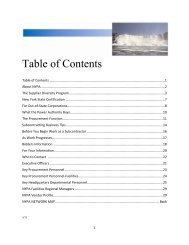July (pdf) - New York Power Authority
July (pdf) - New York Power Authority
July (pdf) - New York Power Authority
Create successful ePaper yourself
Turn your PDF publications into a flip-book with our unique Google optimized e-Paper software.
practicable, of any federal entity, to protect the security of critical infrastructure related to energy<br />
generation and transmission located within <strong>New</strong> <strong>York</strong> State. The Director of Public Security is granted the<br />
authority to review any audits or reports related to the security of such critical infrastructure, including audits<br />
or reports conducted at the request of the PSC or any other agency or authority of the State or any political<br />
subdivision thereof or, to the extent practicable, of any federal entity. The statute provides for periodic<br />
reporting by the Director of Public Security to the Governor, the Temporary President of the <strong>New</strong> <strong>York</strong><br />
Senate, the Speaker of the <strong>New</strong> <strong>York</strong> Assembly, the Chairperson of the PSC and the chief executive of any<br />
affected generating or transmission company or his or her designee. Such reports are to review the security<br />
measures being taken regarding critical infrastructure related to energy generating and transmission facilities,<br />
assess the effectiveness thereof, and include recommendations to the State Legislature or the PSC if the<br />
Director of Public Security determines that additional measures are required to be implemented, considering,<br />
among other factors, the unique characteristics of each energy generating or transmission facility.<br />
The statute provides that ‘‘[e]xcept in the case of federally licensed electric generating facilities, the public<br />
service commission shall have the discretion to require that the recommendations of the director of public<br />
security be implemented by any owner or operator of an energy generating or transmission facility.’’ For<br />
the purposes of the statute, ‘‘critical infrastructure’’ means systems, assets, or things, whether physical or<br />
virtual, so vital to the State that the disruption, incapacitation or destruction of such systems, assets, places or<br />
things could jeopardize the health, safety, welfare or security of the State, its residents or its economy.<br />
(4) The ‘‘Public Authorities Accountability Act of 2005’’ (‘‘PAAA’’) was signed into law in 2006, and it<br />
addresses a wide range of matters pertaining to many public authorities in the State, including the <strong>Authority</strong>.<br />
Among other things, the PAAA increases the number of Trustees of the <strong>Authority</strong> from five to seven;<br />
increases requirements applicable to public authorities’ annual reports; sets forth requirements relating to<br />
independent audits and audit reports of public authorities; sets forth roles and responsibilities of public<br />
authority board members and establishes certain restrictions on such board members; establishes certain rules<br />
regarding board membership, including financial disclosure requirements; sets forth requirements pertaining to<br />
public authorities’ disposition of real and personal property; and creates a State <strong>Authority</strong> Budget Office and a<br />
State Inspector General’s Office. Additional public authority reform legislation took effect on March 1,<br />
2010 which provides, among other things, for State Senate approval of various public authorities’ chief<br />
executive officers, including the <strong>Authority</strong>, and grants the State Comptroller discretionary authority to<br />
review and approve certain contracts entered into by public authorities, including the <strong>Authority</strong>.<br />
(5) On October 1, 2010, the Governor signed into law the North Country <strong>Power</strong> <strong>Authority</strong> Act<br />
(“Act”) creating in law the North Country <strong>Power</strong> <strong>Authority</strong> (“NCPA”). The NCPA’s purpose is to<br />
finance and operate a municipal electric system serving a group of 24 municipalities in the <strong>New</strong> <strong>York</strong><br />
State counties of St. Lawrence and Franklin. It is anticipated that the NCPA would purchase certain<br />
distribution and related assets from National Grid to provide utility service to this area. The Act provides<br />
for the NCPA’s powers and duties, and authorizes the NCPA to, among other things, enter into contracts<br />
to purchase power from the <strong>Authority</strong> and other available sources. It is unclear when the NCPA may<br />
begin operations. It has no assets and many of the actions it must undertake in order to operate are<br />
subject to approval of <strong>New</strong> <strong>York</strong> State regulatory bodies. Accordingly, at this time, it is uncertain what<br />
effect if any the Act will have on the <strong>Authority</strong>’s operations.<br />
Information on legislation affecting the <strong>Authority</strong> is also available from many sources in the public<br />
domain, and potential purchasers of the 2011 Bonds should obtain and review such information.<br />
EXECUTIVE ORDER NO. 111<br />
In Executive Order No. 111, issued in 2001 (the ‘‘Executive Order’’), the Governor, among other<br />
things, required State agencies and other affected entities, as defined in the Executive Order, with<br />
2-42


